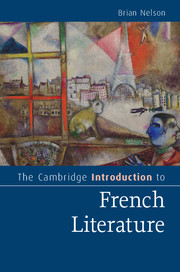Book contents
- Frontmatter
- Dedication
- Contents
- Preface
- Acknowledgements
- Chronology
- 1 Villon: a dying man
- 2 Rabelais: the uses of laughter
- 3 Montaigne: self-portrait
- 4 Corneille: heroes and kings
- 5 Racine: in the labyrinth
- 6 Molière: new forms of comedy
- 7 La Fontaine: the power of fables/fables of power
- 8 Madame de Lafayette: the birth of the modern novel
- 9 Voltaire: the case for tolerance
- 10 Rousseau: man of feeling
- 11 Diderot: the enlightened sceptic
- 12 Laclos: dangerous liaisons
- 13 Stendhal: the pursuit of happiness
- 14 Balzac: ‘All is true’
- 15 Hugo: the divine stenographer
- 16 Baudelaire: the streets of Paris
- 17 Flaubert: the narrator vanishes
- 18 Zola: the poetry of the real
- 19 Huysmans: against nature
- 20 Mallarmé: the magic of words
- 21 Rimbaud: somebody else
- 22 Proust: the self, time and art
- 23 Jarry: the art of provocation
- 24 Apollinaire: impresario of the new
- 25 Breton … Company: Surrealism
- 26 Céline: night journey
- 27 Sartre: writing in the world
- 28 Camus: a moral voice
- 29 Beckett: filling the silence
- 30 French literature into the twenty-first century
- Notes
- Further reading
- Index of authors and titles
- Index of genres, movements and concepts
- Cambridge Introductions to …
- References
16 - Baudelaire: the streets of Paris
Published online by Cambridge University Press: 05 July 2015
- Frontmatter
- Dedication
- Contents
- Preface
- Acknowledgements
- Chronology
- 1 Villon: a dying man
- 2 Rabelais: the uses of laughter
- 3 Montaigne: self-portrait
- 4 Corneille: heroes and kings
- 5 Racine: in the labyrinth
- 6 Molière: new forms of comedy
- 7 La Fontaine: the power of fables/fables of power
- 8 Madame de Lafayette: the birth of the modern novel
- 9 Voltaire: the case for tolerance
- 10 Rousseau: man of feeling
- 11 Diderot: the enlightened sceptic
- 12 Laclos: dangerous liaisons
- 13 Stendhal: the pursuit of happiness
- 14 Balzac: ‘All is true’
- 15 Hugo: the divine stenographer
- 16 Baudelaire: the streets of Paris
- 17 Flaubert: the narrator vanishes
- 18 Zola: the poetry of the real
- 19 Huysmans: against nature
- 20 Mallarmé: the magic of words
- 21 Rimbaud: somebody else
- 22 Proust: the self, time and art
- 23 Jarry: the art of provocation
- 24 Apollinaire: impresario of the new
- 25 Breton … Company: Surrealism
- 26 Céline: night journey
- 27 Sartre: writing in the world
- 28 Camus: a moral voice
- 29 Beckett: filling the silence
- 30 French literature into the twenty-first century
- Notes
- Further reading
- Index of authors and titles
- Index of genres, movements and concepts
- Cambridge Introductions to …
- References
Summary
All around me howled the deafening street.
– Baudelaire, ‘To a Passer-by’Charles Baudelaire (1821–67) occupies a key position in the development of modern writing, not just as the author of the most celebrated collection of verse in the history of modern French poetry, The Flowers of Evil (Les Fleurs du mal, 1857), but as the proponent, in his critical writings, of a new aesthetic based on the experience of city life. According to the Marxist cultural critic Walter Benjamin (1892–1940), Baudelaire, by being the first poet of the city, was the first poet of modernity; he was the first writer to recognize in the transformation of Paris during the Second Empire (1852–70) a radical transformation of society itself, and to perceive the impact the new social reality would have on the creative artist. He is seen as the very embodiment of a sensibility and consciousness we regard as modern.
Modernity and the city
In December 1848 Louis-Napoleon Bonaparte, the nephew of Napoleon Bonaparte, was elected president of the Second Republic (1848–51), which had been born out of a revolution in February of the same year. On 2 December 1851 he staged a coup d'état that gave him dictatorial powers. A year later he proclaimed the Second Empire. He was now Emperor Napoleon III. To establish his authority, and acquire a kind of legitimacy, he pursued a policy of modernization and ‘progress’. He determined to make Paris clean and safe, and above all ‘modern’, and would do this through a vast scheme of urban redevelopment. He entrusted the project to Georges-Eugène Haussmann (1809–91), whom he appointed Prefect of the Seine. The ‘Haussmannization’ of the city was social planning on a spectacular scale, glorifying Louis-Napoleon's empire as if it were a new Augustan Rome. Haussmann's overriding aim, however, was to advance the bourgeoisie's business interests by creating a more efficient transport network – by creating a city that would allow the rapid circulation not only of troops but also of goods, people and money.
- Type
- Chapter
- Information
- The Cambridge Introduction to French Literature , pp. 112 - 121Publisher: Cambridge University PressPrint publication year: 2015



